The reason why you’re unhappy
The first question you tend to get asked when you meet someone at a party is “What do you do?”

That’s a big reason why you’re so unhappy with your life.
It’s a god-awful question and it makes you anxious. Everyone hates that question, but for some reason everyone still asks it.
And when you answer, they make a split-second decision to decide if they want to get to know you better, or leave you behind.
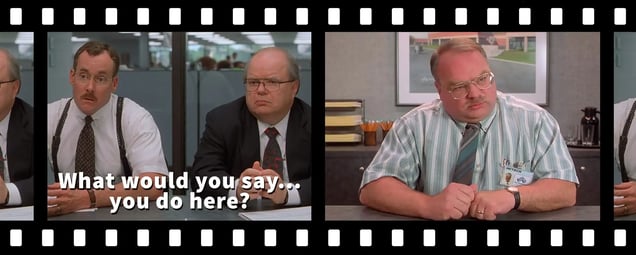
This question makes you anxious because we live in a world of snobs. People take a tiny part of you — like your professional identity — and use it to come to a complete verdict about your value as a human being.
The opposite of a snob, however, is your mother. She doesn’t care about your status. Or your salary, or who you banged last Friday, or the color of your iPhone. None of that matters to your mother. She cares about your soul. But unfortunately, most people aren’t our mothers — and that’s why you worry so much about the judgement of some guy you met at a party who asked “What you do?”

Trust me, more options will not make you happy
To make matters worse, we live in a materialistic world where emotional rewards are tied to material things. That’s why people are willing to pay $2,000,000 for a fucking dog (I swear, that’s a real thing).
But in reality, what people really want when they go after money, big jobs, fancy cars, or multimillion dollar canines is rarely the objects themselves. What they really want is the attention and respect — nay, the love — that are given to those who have those fancy things.
And to add to your anxiety, your parents constantly told you that you could become anything, as long as you worked hard enough. So starting at a very early age, your expectations for your future were sky high. In many cases, unreasonably so.
So even though you were told from day one that you were special, for some reason you don’t feel very special, which is why you’re unhappy right now.
You being broke isn’t the reason either
Last week we published an article about the personal bank accounts of startup founders. A few folks wrote me and said that they wished they had a big bank account. What they were really saying was “If I had money, I’d be happy.” They’re wrong.
It should be great that there’s so much opportunity in the modern world. But think about that for a second.
What if you fail in such a world? What if you don’t manage to get to the top, even though you spent thousands on a fancy degree and your mom said you could do anything you wanted to?
One way to find the answer to that question is to look at self-help shelves in bookstores, where you’ll find two kinds of books that capture the modern anxious condition.
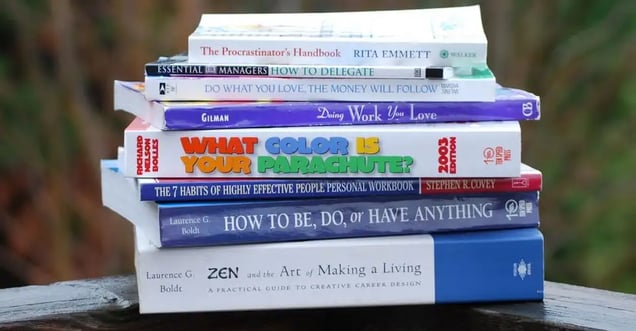
The first have titles like “How to Make It Big in 15 Minutes” or “Be an Overnight Millionaire.” The second have titles like “How to Cope With Low Self-Esteem.” However, the two genres are related.
See, a society that tells people they could have everything, but where in fact only a tiny minority do, ends up with a lot of dissatisfaction and grief.
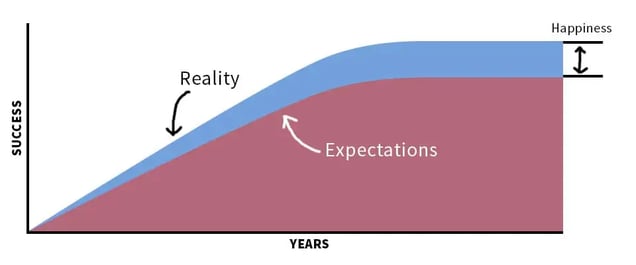
And to add to your big shitpile of issues for why you’re so unhappy, there’s a related problem: our societies aren’t, to a large extent, fair.
Back in the olden days you knew the system was totally rigged. It wasn’t your fault if you were a peasant. And not to your credit if you were the lord. You were born into it.
But nowadays we’re told our societies are meritocracies, places where rewards go to those who “earn” them: the hardworking and clever people.
(As inspirational as they seem, quotes like this only make you more unhappy.)

“Life can be much broader once you discover one simple fact: Everything around you that you call life was made up by people that were no smarter than you and you can change it, you can influence it, you can build your own things that other people can use. Once you learn that, you’ll never be the same again.Steve Jobs
It sounds lovely — but it’s not as great as you think. Why? Because if you really believe in a society where those at the top deserve to be there, that means that those at the bottom deserve to be there, too.
Meritocracies make poverty seem not just unpleasant, but also somehow deserved. In medieval England, people use to call poor folks “unfortunates,” which literally meant those who had not been blessed by the God of Good Fortune.
Today, especially in the U.S. (where meritocracy is big), unfortunates are called “losers.” We scarcely believe in “luck” nowadays as something that can explain where we end up.
It’s no wonder the suicide rates in America have soared in the past few decades. In our modern world, your professional position has become the central verdict on your character.
That brings me to my original point. When someone asks “What do you do?” they aren’t asking how you spend the hours from 9 a.m. to 5 p.m., but “Are you a winner or a loser?”
“And if you are a loser, please get out of my way because I’m going to pretend to go get more guacamole but really I wanna talk to Laura because she’s been in Forbes 30 under 30 and being associated with her will make me feel cooler.”
Here’s how you find happiness
To start, you must refuse to believe that any society can really ever can be meritocratic. Luck or accident are a critical determination of where people end up in the hierarchy. Treat no one — not least yourself — as though they entirely deserve to be where they are.
Second, make up your own definition of success, instead of uncritically leaning on society’s. There are so many ways to succeed, and many of them have nothing to do with status as it’s currently defined within the value system of capitalism. Sure, money can be one of them, but it’s up to you whether it’s the ONLY one.
But remember: those who succeed at making money, rarely succeed at empathy or family life.
“I would like to allocate more time to dating, though. I need to find a girlfriend. That’s why I need to carve out just a little more time. I think maybe even another five to 10 — how much time does a woman want a week? Maybe 10 hours? That’s kind of the minimum? I don’t know.”Elon Musk

Third, you should refuse to let your outer achievements define your sense of self entirely. Of course, that doesn’t mean to not try to be rich and have nice things. It just means that there are so many amazing accomplishments that don’t stand a chance of being captured by that maddening and blunt question, “So, what do you do?”
And finally, and most importantly, you should find fulfilling work, which isn’t easy.
If you wanna be really ridiculously happy, find meaningful work
It’s interesting — the idea that work might be fulfilling rather than just painfully necessary is a strikingly recent invention. I’ll prove it to you. In 1755 Samuel Johnson created “A Dictionary of the English Language“, one of the first and most comprehensive English dictionaries to ever be written. The word “fulfillment” doesn’t even appear.
Nowadays, we not only expect to obtain money through our labor, but to find meaning and satisfaction. We’re told to follow our passion. But like fulfillment, even the phrase “follow your passion” is relatively new and didn’t gain popularity until the 1990s.
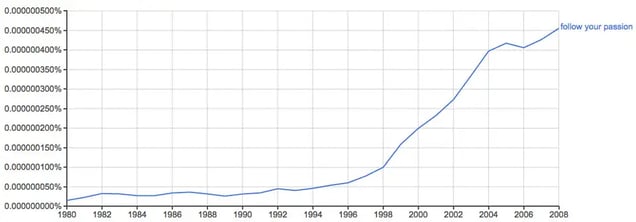
“But what IS my passion,” you ask yourself, “and how do I make a living from it?” It’s not easy to find, that’s for sure, but it’s very possible.
In the pre-industrial world, there were at most 2,000 different trades. Nowadays there are estimated to be half a million. You can study auctioneering, turfgrass sciences, or bowling industry management (those are real degrees).
Because of this, you become so anxious about making the wrong choice that most of the time you don’t make any choice at all. Psychologists call this the paradox of choice — paralysis stemming from too many options.
You should acknowledge that confusion is natural and fear is entirely normal, but let neither of these hurt your chances forever.
With so many choices and the pressure to follow our passion, it’s a big decision, which is why so many of us are having career crises, often on a Sunday evening as the sun begins to set.
The first step in finding meaningful work is to write down everything that you enjoy doing. Building a treehouse, baking, watching TV, folding clothes. Everything. The more offbeat, the better. Don’t even think about money. Financial panic ruins the process.
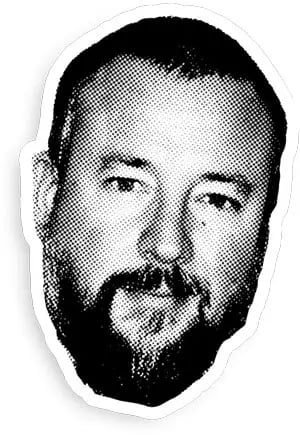
“For me personally, you always think when you are starting out, I am going to make a nebulous amount of money, buy an island, wear an Amadeus wig and go naked and be crazy. But, you know, I was talking recently to Spike [Jonze] and he said ‘Take money out of the equation. And ask yourself what would you do?’ and I realised two things: first I would pay money to do the job I am doing, and second I wanted to build the next CNN, the next ESPN. The money followed in buckets.”Shane Smith, Vice
After you have your list, there will somewhere be a shape of an ideal future self. It’ll be very messed up and in need of being analyzed thoroughly, but at least you’ve started.
The next step for finding fulfilling work is to think. It’s dead simple. It takes an entire week to choose a new car, so it could take a year or more of sustained daily reflection to identify a career that fits. Don’t feel guilty about this. We may need to empty every weekend for months to sort out the biggest conundrum of our lives.
After you’ve had a good think, then you must act. Your thoughts and action need to collide in the real world. Take real steps to gather information on your list. For example, by shadowing, interning or volunteering. They don’t need to be huge steps, you just need to do something. We mustn’t think we always need to resign on Monday.
And finally, after action, you’ve got to develop confidence. All your life you’ve imagined that certain people, but not yourself, have been pre-ordained to get certain things and have confidence. It isn’t true. Developing it is much simpler than you think.
A lack of confidence is basically a misunderstanding of the way the world works. One of those misunderstandings is that people who you think are confident never have self doubt. Nonsense.
“So, what do you do?”
Next time you meet someone, and they ask “What do you do?” the appropriate answer is to tell them what you enjoy doing.
Running 5ks, listening to gangster rap, skateboarding, walking your dog, playing Tinder, washing your clothes, taking walks, traveling to South America, doing puzzles, watching movies with your boyfriend, day dreaming, reading Wikipedia.
Or just tell them to stop being such a conforming ass clown. Either one will work.
This article is a combination of two videos by the School of Life (“Status Anxiety” and “How to Find Fulfilling Work“) , and the post “Why Gen Y is Unhappy,” by Tim Urban from Wait But Why. A lot of the text and ideas in this article were directly taken from one of those three pieces, so if you liked this, please check them out – they’re top notch.
